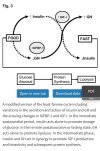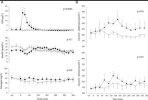Second question:
You have written that it's important that the HGH is taken without food because in insulin level had to be low.
That's what I don't get. Why is eating not a problem after the HGH injection regarding the maximum of fat oxidation?
Do you mean because of the insulin resistance the fat oxidation would stil be on max?

GH has acute and chronic metabolic effects. As outlined below the acute actions include stimulation of lipolysis and increased FFA levels in the blood. More prolonged GH exposure, e.g., repetitive GH pulses in the presence of adequate nutrient supply and subsequent elevations in systemic and portal insulin levels, induces hepatic IGF-I production (23). This is accompanied by suppression of IGF binding protein (IGFBP)-1, which may act to increase free IGF-I. Eventually protein stores, lean body mass (LBM), and a majority of body organs grow, and body fat mass decreases (Fig. 3).
The order and time sequence of events are of importance. GH stimulates lipolysis and causes insulin resistance within 1–2 h, and these effects disappear after approximately 8 h (35, 36).
The stimulating effect of GH on IGF-I production and action is a more chronic process, which, as previously discussed, depends on a positive energy balance and ensuing elevations in insulin. Thus, during prolonged sc GH administration, the actions of IGF-I and insulin prevail 8–10 h after each injection




